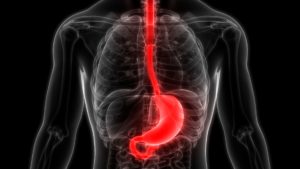You know the burning sensation, discomfort, and maybe even nausea associated with heartburn. The feeling can definitely spoil your evening, eventually leading you to hesitate before enjoying that pizza or burrito during a night out with your family and friends.
You’re far from alone in this. Occasional heartburn is very common, and usually only involves minor annoyances or discomfort. Many individuals, however, experience more significant acid reflux on a regular basis, known as gastroesophageal reflux disease.
Fortunately, there are many ways to prevent acid reflux and reduce heartburn symptoms that may ultimately make you feel better overall.
What Causes Heartburn or Acid Reflux
Basically, acid reflux is when acids move back up into your esophagus from your stomach.
Normally, swallowed food travels down the esophagus, and cells in the stomach produce acid and an enzyme called pepsin to aid in digestion of the food. A band of muscle at the lower part of the esophagus, called the lower esophageal sphincter, acts as a barrier to keep stomach contents from going back up into the esophagus.
This barrier relaxes to allow food to pass into the stomach, but if it is weak, compromised, or overwhelmed, it may allow some of these acids to rise back up into the esophagus. There is no known single cause of GERD, but delayed emptying of the stomach, injury, bloating, or having too much acid in the stomach can trigger acid reflux.
9 Tips for Acid Reflux Prevention and Symptom Reduction

Acid reflux prevention tips include avoiding high-fat foods, tomatoes, onions, and garlic, as well as not eating before bedtime.
1. Avoid eating or snacking three hours before bedtime.
2. Sleep slightly elevated.
3. Modify certain eating habits.
• Reduce caffeine consumption
• Avoid acidic foods and other trigger foods and drinks, including:
› Berries
› Certain juices
› Citrus fruits
› Spicy foods
› Garlic and onions
› Tomatoes
› Fried, greasy, and other high-fat foods
› Mint (gum, candy, etc.)
› Carbonated beverages
› Alcohol
› Sugary foods/sweets, especially chocolate
4. Stop smoking.
5. Avoid strenuous physical activity after eating.
6. Lose weight or maintain a healthy body weight.
7. Limit alcohol consumption.
8. Do not overeat in one sitting.
9. Talk with a gastroenterologist about any medications you may be taking, as the medications may cause or contribute to acid reflux symptoms
Signs of GERD

Heartburn or acid reflux occurs when acids move back up into your esophagus from your stomach.
If you regularly experience the above symptoms after eating but are unsure of the cause, it may help to recognize the signs of GERD. In addition to heartburn, symptoms may include:
• Regurgitation
• Difficulty swallowing
• Excessive salivation
• Gas and bloating
• Pain or discomfort in the chest
• Bad breath or a sour taste in the mouth
• Chronic dry, irritated, or sore throat
• Excessive clearing of the throat
• Frequent swallowing
• Persistent cough
• Dental erosion or gum disease
• Discomfort in the ears and nose
• Trouble sleeping
What to Do if Your Heartburn Symptoms Do Not Decrease
Many people make appointments with a gastroenterologist because they are concerned that their acid reflux symptoms are a more serious condition. In some cases, the symptoms of heartburn mirror those of certain other stomach disorders or even cancers. If you regularly experience heartburn and acid reflux prevention tips do not help, it’s important to see a gastroenterologist, such as one of the doctors at Macomb Gastroenterology here in the Shelby Macomb Medical Mall. Uncontrolled GERD may lead to Barrett’s esophagus, a more serious but less common condition.
Ultimately, here’s the good news. Many tips for reducing acid reflux coincide with a general improvement in health, so it can lead to a positive change in your overall well-being.

Recent Comments